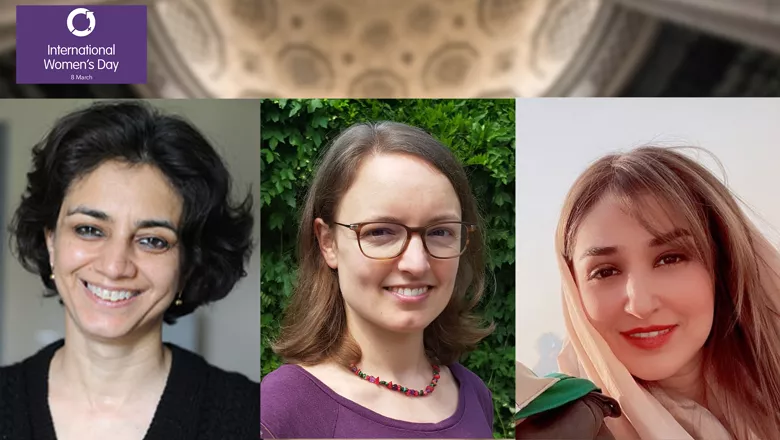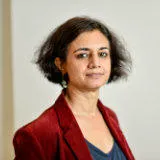I believe, one of the crucial things that has had, and will in future have, a significant effect on equality and bringing balance in any environment is starting with people in positions of power...
Dr Maryam Mirfatah
08 March 2022
International Women's Day: 'It's crucial to have more diversity in economics'
International Women’s Day gives us all an opportunity to celebrate women’s achievement, raise awareness against bias and take action for equality.

This year, we are focussing on women in economics by highlighting the gender bias in teaching and study, sharing the journey of our academics into the discipline, and looking ahead at what can be done to tackle underrepresentation in the future.
According to a Royal Economics Society report, women are underrepresented "at almost every level" within the discipline of economics at UK universities and, in recent years, the society had found signs of “stagnation and retreat” in the closing of gender gaps.
According to the report, across all students, from undergraduate to PhD, there are twice as many men studying economics as there are women in UK universities. The report also highlighted that only a quarter (26 per cent) of economists working in UK academia are female, and only 15 per cent of economics professors are women.
So, what can be done?
We spoke to three academics working in the fields of economics and political economy in our school to hear more about their paths into the discipline and their hopes for the future.
What’s great about being an economist/political economist?
Amrita Dhillon, professor of economics, said: “The best thing is that you can apply the methodology to almost any social science problem - whatever sparks curiosity! The standards of rigour in methodology are high and its challenging to publish in academic journals but if you do, you feel a great sense of accomplishment.”
Dr Mareike Beck, a Leverhulme Early Career Fellow, said: “Being a political economist is great because I can focus my research on what I care about – injustice and unequal power relations – and I can problematise financial logics or institutions that we often take for granted. We have many problems in our economy and much research has demonstrated that financial markets are a crucial site of inequality.
“Unfortunately, economic activity is often driven by uneven power relations that perpetuate inequality. As a political economist, I analyse some of those power relations and therefore expose the underlying reasons of why the current rules of the economy often do not work. One problem here is that for the past decades, financial markets have produced many crises with devastating consequences. While financial policy often targets the instability of financial markets, it aims to stabilise the existing financial institutions in an attempt to reduce the number of crises. This is a misguided focus.
“My research instead targets our existing institutions and practices as key problem, rather than accepting them as neutral or natural economic phenomena. Political economy often goes a bit deeper to understand the driving forces and contradictions of your economic institutions, this interests me a lot because those are the issues we need to tackle if we really want to change anything.”
Dr Maryam Mirfatah, a lecturer in economics education, said: “I believe, one of the crucial things that has had, and will have, a significant effect on equality in most environments is starting with people in positions of power, like economic governors. International organisations like the IMF that is mostly directed by women, has had a remarkable effect in empowering women all over the world through supporting to the highest level of economic decision-making. The more women becoming successful economists, the more people will be influenced to respect equality in working places."
Why did you choose economics/political economy?
Dr Beck said: “I am interested in how economies function, who gets to decide the rules and who benefits from that. More specifically, I analyse processes of financialisation which means I try to understand why and how financial dynamics change, and how they dominate so many parts of our lives. Political economy is a useful tool to tease out the political foundations of what we often think are abstract, disconnected global financial markets and ground them as the social institutions that they are. This allows me, for example, to focus on how banks turn everyday retail financial products into global assets and trade them in offshore markets, what is driving that process, and its socio-economic impact.”
Dr Mirfatah said: “Having a BSc in statistics, there was still a gap in my knowledge which I needed to expose myself to, so I embarked on my MSc and then PhD in economics. It’s been a great honour for me to present myself as an economist. I see myself as a macroeconomist with a great interest in central bank policy making. I hope there will come a day that women and men will be treated equally within and across all disciplines.”
Why is it important to get more women into economics and political economy?
Prof Dhillon said: “Economics as a field has been dominated by men, more so at the top. This creates a culture where it is difficult for women to succeed due to the different roles in society and the different ways of communicating.
“However, this means that certain topics or fields if research that are more important for women tend to get neglected or may miss some perspectives. Second, diversity creates its own dynamics in terms of new research ideas on old topics. I think it’s important to have diversity in the profession, so we do not lose the best talent and the different perspectives this brings.”
Dr Mirfatah said: “The only ones who can significantly contribute to equality are women themselves. By trusting in themselves, raising self-esteem, belief, and faith - which can be propagated by representative women - these vibes can be streamed all over the world. I believe women in economics considerably improve the situation of other women all over the world.”
Dr Beck said: “It is absolutely crucial to diversify who gets to talk about economic issues and who is seen as an economic expert. The economy is a central part of social life but is often not well understood. It is often portrayed as a complex phenomenon that can only be understood by certain specialists. It is complex, no question, but the economy is ultimately a social and political institution which concerns us all.
“We do not need to be specialists of quantitative models or theories of neoclassical economics to analyse what is going. However, the academic disciplines of economics and political economy are still not very diverse, though luckily that has improved. Economics in particular rests on a limited set of assumptions and is therefore somewhat disconnected from the messiness and complexity of the real world.
“While every academic discipline abstracts from reality, and uses theories that highlight certain aspects at the expense others, economics is dominated by a form of groupthink that neglects many aspects of economic life that cannot be measured by numbers or models. This is problematic because macroeconomic policies, such as monetary policy, often rest on these models and therefore has a limited understanding of our economy, and its socio-economic effects.
“Central banks have in fact recently admitted that policy makers have a limited understanding of the inequality they produce. Isabell Schnabel, executive board member of the European Central Bank, for example, says she is often the only women in meetings. Therefore, it is urgent to get more women into economics, political economy and economic decision-making processes.
Equally important, however, is a more fundamental rethinking of what ‘economics’ means, and what counts as economic activity. Here, I think, political economy offers a useful approach to understand how social reproduction is a key part of economic activity, that is the cultural, social and biological reproduction of society.
“This includes the care work necessary for the reproduction of labour, but also the reproduction of cultural, economic, political and social values and institutions, work that has been traditionally done by women and that is still unequally distributed. And it was originally women who have exposed that the everyday, unpaid and undervalued labour often done by women is in fact central to the functioning of our economy and wellbeing. We now know in theory that this labour is crucial and has to be equally distributed and valued.
“But let’s remember that is was a long struggle mainly fought by women to get us here, and we still have a long way to go until this knowledge is represented in actual economic practice. Diversifying who gets to be an economic expert and what counts as economic activity will make some strides towards that direction.”

